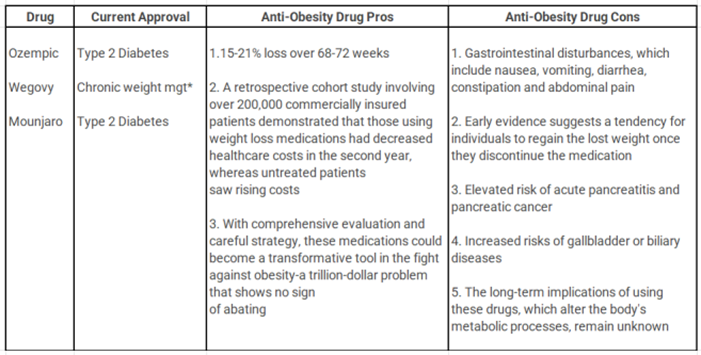The Bolton Health team has received recent questions about obesity medications. We recognize that each health plan we work with has a different stance on supporting or opposing the coverage of anti-obesity medications (AOMs). We are here to advise on a client-by-client basis as we continue to study the impact of AOMs on health plans and navigate these new waters.
An overview of AOMs: GLP-1 drugs are a class of medications used to treat Type 2 diabetes and obesity. The Food and Drug Administration (FDA) has approved some GLP-1 drugs only for treatment of Type 2 diabetes and others (AOMs) for weight loss.
How GLP-1 medications work: GLP-1 medications mimic a naturally occurring incretin hormone made in the intestine which is triggered by food consumption. This hormone boosts insulin release, slowing sugar output from the liver, delaying digestion and curbing appetite, making an individual feel full longer. Introducing a synthetic version of this incretin hormone tricks the body into believing it has been fed without food intake. As a result, individuals on these medications tend to eat less and, when coupled with a balanced diet and regular exercise, can experience significant weight loss.1 AOMs are used as a supplement to a reduced calorie diet and increased physical activity for chronic weight management, but there is mounting concern that people taking these medications are only relying on its effect to lose weight without subscribing to a disciplined exercise and diet regimen.
The benefits and drawbacks of prescribing AOMs for weight management: Obesity is not merely an issue of appearance; it is a complex health condition with multiple contributing factors, including behavioral aspects, genetic predispositions, hormonal influences and underlying medical conditions. Obesity is linked to heightened risks of over 50 disease states and conditions, including diabetes, heart disease, stroke, and certain types of cancer. The regulation of body weight is a nuanced process, not simply a matter of consuming fewer calories and increasing physical activity. These drugs are being touted as potential game-changers in weight management.1
While AOMs are effective in helping patients lose weight, studies consistently show that when the drug is paused/terminated, patients regain weight quickly. According to an analysis of U.S. pharmacy claims shared with Reuters (July 11, 2023), only about one-third of patients prescribed a popular AOM, like Novo Nordisk’s Wegovy, continued use after one year; yet, total healthcare costs for the group rose sharply.
GLP-1 medications: Although there are a number of GLP-1 medications on the market, here is a look at the top three:

*Obese (BMI > 30) or overweight (BMI > 27) and have certain other risk factor
The overprescription of GLP-1 medications: The only GLP-1 drugs currently approved for weight loss are Wegovy, as indicated in the chart above, and Saxenda. However, doctors are prescribing drugs approved only for Type 2 diabetes, specifically Ozempic, solely for weight loss. We recommend health plans work with their pharmacy benefit manager (PBM) to ensure that Ozempic and other GLP-1 are authorized only for members diagnosed with diabetes.
Pharmacy benefit costs to employers: The typical annual cost for GLP-1 medications for weight loss therapy is ~$16,000 per patient. Approximately 22% of employers in the U.S. currently cover drugs for weight loss on their pharmacy benefit. According to a 2018 report by The Milken Institute, obesity-related complications resulted in $1.39 trillion worth of direct medical treatments and indirect productivity losses annually due to chronic diseases in the U.S. With the high cost of weight loss drugs, health plan sponsors are now faced with the dilemma: should we cover these new, high-cost weight loss medications that are garnering significant attention?
We are here to help: Many health plan sponsors are already aware of the immediate costs and complications anti-obesity drugs pose to their organization, although there may be long-term advantages. As your health consultant, we want you to be aware of the pros and cons of offering anti-obesity drugs and alternative treatments, such as considering bariatric surgeries at specific centers of excellence for fixed fees and a higher likelihood of long-term positive outcomes. Please contact us to discuss AOM strategies best suited for your organization.
Footnotes/references:
1 Balancing the Scales: The Value and Viability of New Weight Loss Medications; Goodroot 2023
Other key resources:
https://www.nejm.org/doi/full/10.1056/NEJMoa2032183 (Sema/Wegovy for weight loss without diabetes).
https://www.nejm.org/doi/10.1056/NEJMoa2208601. Adolescents
https://www.nejm.org/doi/full/10.1056/NEJMoa2206038 (TZP for treatment of obesity without diabetes).
https://jamanetwork.com/journals/jama/fullarticle/2787907 comparing liraglutide (approved for obesity as Saxenda, on the market for almost a decade) to Wegovy (semaglutide).
https://jamanetwork.com/journals/jama/fullarticle/2787907
https://www.reuters.com/business/healthcare-pharmaceuticals/most-patients-using-weight-loss-drugs-like-wegovy-stop-within-year-data-show-2023-07-11/ (Reuters article)
DailyMed - WEGOVY- semaglutide injection, solution (nih.gov)




